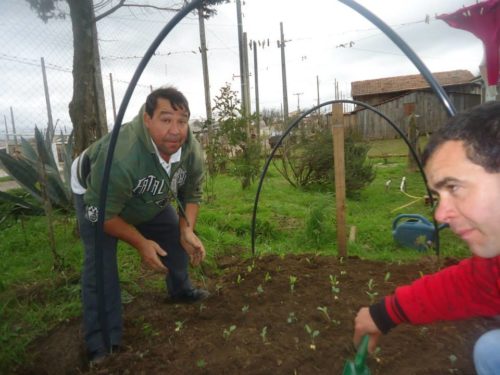Brazil is the fifth largest country in the world — both geographically and in terms of population. It is truly massive, sharing borders with every other country in South America except for Ecuador and Chile. The Amazon rainforest – recognized for having the greatest biological diversity on the planet — sprawls over the country’s northern half, and there are rugged mountains to the south. Despite its wealth of natural resources and beauty, Brazil suffers from staggering poverty, rising inflation, unemployment, and a lack of social development.

Growing vegetables provides food and a new skill sets for children and adults.
These issues are especially pronounced in cities like Lages, located in southern Brazil. Lages’ population — about 150,000 — has been increasing steadily as poor families from the countryside move to the city in search of employment and better lives. Their situations, however, usually do not improve; many families are forced to live in urban developments like Novo Milênio, which lack electricity, drinking water, and even sewage services. Job opportunities there are extremely limited, and area public schools are ill-equipped to provide a quality education to the ever-increasing number of students. Children roam the streets — sad, neglected, and vulnerable to threats of crime, drug abuse, and worse.
A center helping families
The families eat, share, and trade the vegetables with other families — and sometimes they sell them at a low cost to make a small profit.
The plight of these children aroused the compassion of the CARITAS – Novo Milênio Center, a nonprofit organization run by the Catholic Church. One of our affiliated projects in Brazil, CARITAS, was established to help these children and community members rise above the difficult socioeconomic circumstances from which they come.
One of the ways in which the center is helping children and their families, thanks to the support they receive from Children Incorporated, is by establishing vegetable gardens at the children’s houses in nearby neighborhoods! The families, along with their children, tend to the gardens, which teaches them all gardening skills, and helps the parents become more self-sufficient when it comes to feeding their family. The families eat, share, and trade the vegetables with other families — and sometimes they sell them at a low cost to make a small profit!
***
HOW DO I SPONSOR A CHILD IN BRAZIL?
You can sponsor a child in Brazil in one of two ways: call our office at 1-800-538-5381 and speak with one of our staff members; or go online to our donation portal, create an account, and search for a child in Brazil that is available for sponsorship.

